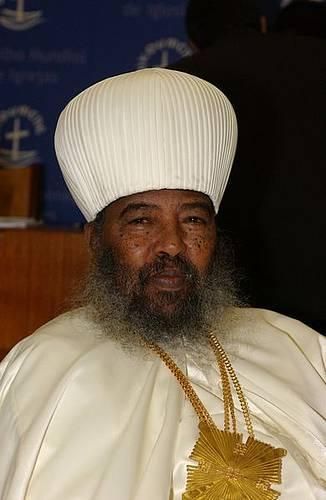By Alexander Belopopsky (*)
Patriarch Paulos, head of the Ethiopian Orthodox Church, is a striking figure in the central committee, with his flowing white ecclesiastical robes and carrying his traditional hand-cross, symbol of his ministry. As with the other presidents elected at the WCC's 9th Assembly in early 2006, this is his first involvement in central committee as president.
The son of a priest, Abune Paulos, Patriarch of Ethiopia, is head of the 40-million strong Ethiopian Orthodox Tewahedo Church since his election in 1992. As a young priest and monk and later a bishop, he directed the development and refugee service of the church, and became actively involved in international ecumenical work. In 1976, he was imprisoned for seven years for his beliefs by the Marxist military government, and subsequently spent several years in exile in the USA, where he completed his doctoral studies at Princeton Theological Seminary. In 2006 he was elected president of the World Council of Churches from the Oriental Orthodox church family.
How did Your Holiness first become involved in the ecumenical movement and what was your first contact with the WCC?
As a young monk I was always interested in the WCC, and was fascinated by its efforts to assist churches behind the "Iron Curtain", and its role in the anti-apartheid struggle. WCC seemed to offer a credible presence in the face of every crucial world problem.
I was given an opportunity to be involved in the work of the WCC as a young priest, including the Commission on World Mission and Evangelism (CWME) and the Urban Rural Mission programme. Later, I accompanied the delegations of my church to the WCC assemblies at Uppsala (1968) and I was elected to the Faith and Order commission. Then, in 1975, I attended the 5th Assembly of the WCC in Nairobi, the first to be held in Africa. However, on my return from the assembly, I was put in prison by the communist authorities and there I stayed for seven years, followed by a period of house arrest.
How do you see the current situation of the ecumenical movement?
Today we live in a troubled world. Our task in the ecumenical movement is not to deal only with the Christian world, but with the whole of God's creation as we are all His creatures.
The WCC has the task to offer a visible, concrete response to the world's problems on behalf of the world's churches, and the WCC must go into those places where hope, dialogue and reconciliation are needed. These remain the only solutions to the world's problems. We cannot solve all the problems. But I am convinced that, through dialogue, we can heal wounds, appease hearts and bring signs of hope.
There was a period when I felt some disappointment with the WCC, but I remained silent. However, there seems to be a new, fresh start in the WCC at this time, and I am full of hope that we can make a real contribution.
What do you see as your role as WCC president?
Since God called me into this situation, I am at the service of the WCC, and I am ready to support whatever the leadership of the Council proposes.
Can you tell us something about the current situation in Ethiopia and the Ethiopian Church at this time?
There has been a continuous Jewish and Christian presence in my country for more than 3,000 years, and the first Ethiopian follower of Christ is mentioned in the Acts of the Apostles. Today our church counts 45 million faithful, 50,000 church buildings and, although it may be difficult for you to imagine, 500,000 clergy!
The church is ancient and its traditional life and festivals have been preserved. Despite the dark period during the communist regime, monastic life has also been sustained, and many young people continue to flock to these spiritual centres to learn about their faith.
What do you see as the role of the church in the political life of Ethiopia?
Ethiopia has known various forms of government in its long history, but no democratic government existed before it was introduced 15 years ago. To enjoy democracy, all the people need to understand not only their rights, but also their responsibilities. This period has not been easy, and there have been misunderstandings and conflicts.
I appeal to all people to learn to tolerate what they disagree with, and I ask people to show patience. But I believe that Ethiopia is beginning to make progress and I am hopeful that differences will not prevent people from working together.
As WCC president, what is your message to the churches?
I believe that we all have to be true representatives of our own churches, and that we all have to do our part to serve and contribute, through our communities, the whole world. We in the ecumenical movement are not here to make one part of the world better than the others, but, rather, we are here to serve all people.
(848 words)
(*) Alexander Belopopsky is the coordinator of the WCC's Public Information Team.
